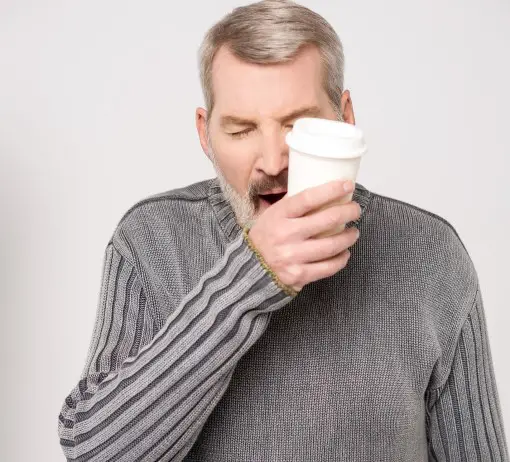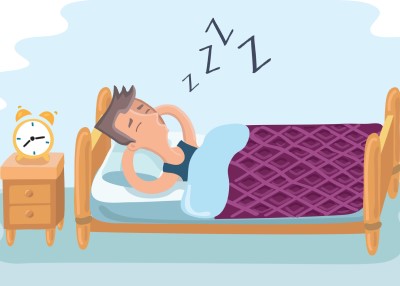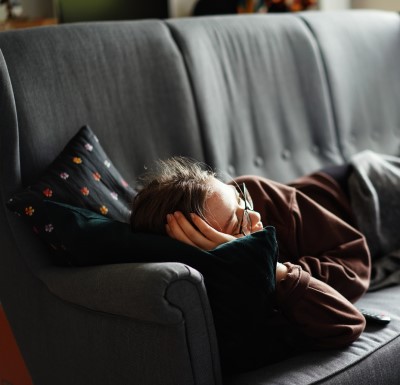
11 Practical remedies worth a try if you’re feeling tired after retirement
By Jason Wooden, PhD | October 31, 2021
The reasons people struggle with feeling tired after retirement include changes in routine, dehydration, health issues, medication, isolation, and age-related changes in sleep.
For more energy during the day, try improving your sleep hygiene, staying more engaged and active, exercise, dietary changes, and seeing a doctor to check known causes of day time fatigue.
Think you’re the only one feeling tired after retirement?
After years on the grind, you’ve finally done it.
You’ve crossed the finish line.
Get out of bed when you want, spend the day doing what you want, and vacation when you want.
What’s not to like?
Unfortunately, if you’re constantly feeling tired after retirement that will certainly put a damper on what’s supposed to be your golden years.
Yes, retirement is supposed to be a change, but not for the worse. After all, what’s the use of your new found freedom if most of the time you’re low on energy and dragging throughout the day?
With millions of people retiring every year, you’re certainly not the only who has struggled with this issue.
Money, health, are medical care are among the more obvious issues retirees struggle with. There’s also boredom and loneliness.
However, you don’t hear as much talk about the issue of fatigue.
Is it just one of those things you have to live with after retirement?
Is it something to worry about?
Let’s take a look at what could be happening and some practical things you can do so you’re not feeling so tired after retirement.
The surprising reasons you’re feeling tired after retirement
Lots of things change when you retire, not least being you’re getting older. Among the reasons you could be feeling so tired since you retired are:
Your routine has changed
Your mind and body is used to being on a schedule and structure. In fact, you’ve been living this way for most of life.
All of a sudden, you’re without your normal landmarks whether it’s a daily routine, activities, relationships, habits, or sleep-wake cycles. It’s no surprise that retirement can throw off the mood and energy level of people.
You’re dehydrated
Are you getting an adequate amount of water every day? Fatigue is a common symptom of dehydration.
If you’re not sure about this for you, some symptoms to look for include feeling thirsty, headaches, dizziness, dry mouth, and dark colored urine.
Too much sugar
As delicious as your favorite sugary treats are, excessive refined carbs can lead to blood sugar spikes, energy crashes, and leave you drowsy.
Your health has changed
Has your health status or body recently changed? Have you gained weight since you left the job.
Some of the health issues linked to day time fatigue are:
- anemia (iron deficiency)
- underactive thyroid
- coeliac disease
- chronic fatigue syndrome
- diabetes
- too much calcium in your blood (hypercalcemia)
- infections
Your meds
Unfortunately, some commonly used medications can make it harder to stay awake.
Among the meds known to cause drowsiness are:
- antihistamines
- allergy meds
- anti-psychotics
- antidepressants
- anxiety meds
- muscle relaxants
- antidepressants
- heart meds
- prescription pain meds
Another reason you’re feeling tired after retirement is that you’re sleep has changed
Okay, now we get to the obvious.
A big reason you’re feeling so tired during the day could be that you’re not sleeping as well as you did before you retired.
On any given night, one in three adults struggle with poor sleep. Research suggests that insomnia affects 45% of adults aged 18 to 64 years.
Among the reasons you’re sleeping more poorly are:
Change in routine
Our bodies are designed to be in tune with day and night. We get sleepy when the sun sets and wake up when the sun rises.
If you’re not going to bed and waking up on a regular schedule, that’s bound to throw off your sleep. If you’re not getting out and moving your body, that will affect how sleepy you feel at bedtime too.
Ditto, if you’re watching TV and eating the wrong things late at night.
All of these changes in routine will keep you from having a normal sleep-wake cycle.
Age-related sleep changes
It shouldn’t be a surprise that sleep patterns tend to change as you age. Most people find that as they get older they have a harder time falling asleep, wake up more often during the night, and arouse earlier in the morning.
They also spend less time in deep restful sleep.
Sleep disorders
Another reason besides insomnia you’re sleeping more poorly is that you have an underlying sleep disorder. It turns out they’re more likely as you age.
One of the most common sleep disorders is obstructive sleep apnea which affects as many as 60% of older adults.
It happens when air flowing to your lungs is restricted. The drop in oxygen arouses your body out of deep restful sleep into a lighter sleep.
It’s a real sleep killer that can leave you in the morning feeling as if you haven’t slept at all.
Change in mood
I’ve already mentioned how many retirees struggle with depression. For some, there’s also the added stress and anxiety from a new normal and uncertainty about the future.
Did you know there’s a strong link between poor sleep, stress, anxiety, and depression?
And that poor sleep can increase your risk for all three?
If you’re not careful, you may get into a downward spiral.
11 Things to try if you’re feeling tired after retirement
Now we get to the good news – there’s plenty you can do if you’re a retiree who’s struggling with feeling tired.
Depending on your situation, some simple changes may do the trick or you may need to do something more serious that requires a bit of an investment.
Let’s take a look at your options:

1) Improve your sleep hygiene
Getting the best possible sleep you can every night will help you have more energy during the day.
Unfortunately, there’s a long list of things that can cause problems for sleep. This makes it important to practice good sleep hygiene, the everyday habits that set the stage for deep restful sleep.
For better sleep hygiene, you should:
- keep consistent wake up & sleep times
- avoid naps
- exercise during the day
- avoid large meals, alcohol, or stimulants such as caffeine before bedtime
- avoid using TVs, laptops, or other electronics before sleep
- bedroom dark, cool, quiet, & relaxing
- maintain a regular bedtime routine

2) Stick to a routine
Speaking of routine, it’s really important to stay on a schedulue as tempting as it is to stay up late watching your favorite program or to sleep in.
Get out and do things during the day, sleep when your body says it’s time to sleep. It’ll be great for your body and well-being.

4) Hydrate
As mentioned earlier, day time fatigue is a common symptom of dehydration. Unfortunately, seniors are more at risk for dehydration because of changes in their body.
It’s generally recommended to drink around eight 8-ounce glasses each day.

5) Take vitamins
Vitamins are one way to boost energy, especially if you’re not regularly eating a well-balanced diet.

6) Eat lighter meals
Heavy meals can slow down your metabolism and make you feel sluggish. Try eating lighter meals at breakfast and lunch.

7) Keep a stash of healthy snacks
Healthy snacks can help keep your blood sugar and energy levels steady. Avoid over sugary snacks that lead an energy crash hours later.
Instead, look for foods with a mix of protein, complex carbs, and healthy fats such as:

8) Sneak in a power nap
A quick snoozer can do wonders. Sleep experts recommend you keep your naps under 15-20 minutes so you don’t wake up in a brain fog.

9) Stay engaged
It’s easy to feel isolated and become more sedentary if you don’t get out of the house much. This can lead to poorer health, depression, and insomnia.
Make sure you’re getting out on a regular basis and interacting with other people. You may want to try joining a club for your favorite hobby, doing some fun stuff with people you know, or volunteering for a cause.

10) Get a check up
When is the last time you had a checkup? It should be clear by now how things going with your body can cause you to feel tired during the day.
Whether it’s an unresolved health issue, medications, or an undiagnosed sleep disorder, a doctor can help you figure out why you’re feeling tired after retirement.
If you don’t deal with these underlying issues, you may be just sticking a band aid on things.

11) Talk to someone
Stress, anxiety, and depression can leave you feeling drained. They are also linked to poor sleep.
A type of counseling known as cognitive behavioral therapy (CBT) has been found to be effective for both anxiety and depression. It focuses on changing thinking and behavioral patterns.
There’s hope for better days
We live in a fast-paced world where there’s a lot seemingly out of your control.
However, what you do with your body and how you structure your days is under your control. A doctor and other specialists can help figure out the rest.
We know a lot about the reasons older adults struggle with day time fatigue.
So, if you’re frustrated from feeling tired after retirement, start making changes today to revitalize your waking hours and make best of every day of your retirement.
You may also be interested in:
15 things to try to help you stay awake at church
14 things to try if you’re too lonely to sleep
17 Sleep-friendly ways to pass the time when bored in bed
10 things to try if you’re losing sleep over politics
3 things to do if you’re worried and losing sleep over rising gas prices
A survival guide for people who can’t sleep after social events
Sleep apnea:
14 remedies for sleep apnea and pain
Worried sleep apnea is ruining your marriage? – 3 practical tips for survival and recovery
Other:
Sources:
1. “Number of retired workers receiving Social Security in the United States from 2010 to 2020”, statista.com
2. “Dehydration”, Cleveland Clinic website
3. “10 medical reasons for feeling tired”, NHS website
4. “What to do when medication makes you sleepy”, 2019, Harvard Health website
5. Prevalence of Depression in Retirees: A Meta-Analysis. Healthcare (Basel). 2020 Sep; 8(3): 321.
6. “Why does depression make you feel tired?”, 2020, MedicalNewsToday
7. “Talking Points”, World Sleep Society website
8. “Understanding Sleep Disorders in Older Adults”, 2018, Psychiatric Times
9. “Aging changes in sleep”, MedlinePlus
10. Sleep Disorders in the Older Adult – A Mini-Review. Gerontology. 2010 Mar; 56(2): 181–189.
11. “Sleep and Mood”, Harvard Medical School Get Sleep Website
12. “Drink Up: Dehydration is an Often Overlooked Health Risk for Seniors”, 2018, Cleveland Clinic website
13. “Water: How much should you drink every day?”, Mayo Clinic website
14. “Retirement blues: Taking it too easy can be hard on you”, 2018, Harvard Health Publishing
Connect with us:
About Us
Better Sleep Simplified® was founded as a place for you to get clear and well-researched information.
Our goal is to make sure you know about your options so that you take action sooner rather than later.
Check us out on YouTube:
Watch and Learn
Helpful sleep tips, interesting sleep facts and statistics you want to know about
Affiliate Disclosure
This site is a participant in the Amazon Services LLC Associates Program and other affiliate advertising programs designed to provide a means for sites to earn advertising fees by advertising and linking to them.
Important: BetterSleepSimplified.com is for informational purposes only and is not intended or implied to be a substitute for professional medical advice, diagnosis, or treatment. Always consult a physician for sleep and health concerns. See additional information.

